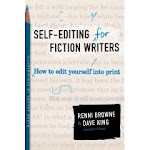Today, we’ll focus on three topics related to words.
Overused Words
One weakness in most first drafts is the use of pet words and phrases. Recognizing this weakness gives us the opportunity to make more of our writing, and create a stronger story for the reader.
I’ve compiled a list of words that I provide to my clients, and I’ll share it with The Book Doctor’s readers, too. Just visit this page, and click on the link for the free “Overused Words List” download in pdf format.
Learning to spot those weak words gives us an opportunity to show, instead of tell; an opportunity to be active with our story, rather than passive. Author Jeanne Marie Leach provides some excellent examples in her book Writing Basics for Beginners.
First, she offers a simple sentence, and shows how to reword it to eliminate the overused (and passive) word “was”:
She was tired.
Her body ached as she climbed the stairs to the house.
She offers another example:
Jane was angry at her brother for telling her parents she was the one who’d caused the stain on the carpet.
Then she shows us how to eliminate the “was” and pull the reader right into the middle of the story, with words that show, rather than tell:
Jane frowned and stomped her foot. “You little brat! You had no right to tell Mom and Dad I spilled my juice on the rug. I’m going to ring your stupid little neck when I catch you.”
The difference is amazing, isn’t it? It's much more powerful, and we feel like we're right there in the middle of the scene.
Repetitious Phrases
After you’ve scanned your manuscript for the list words, be sure to check for repetition of favorite phrases concerning your characters. Does your heroine regularly tuck her hair behind her ear, chew her bottom lip, or tap her fingernails impatiently? Does your hero crack his knuckles, toss his head back, or wink? The reader will catch these phrases faster right away, so you’ll want to add variety. If you need help coming up with different traits, just pay a visit to the coffee shop or bookstore for observation. (Any excuse, right?) Watch how people interact, then watch their movements when they’re sitting alone. You’ll be surprised at how much fresh material you can gather in just one trip!
Word Usage
Many writers like to share their knowledge of big words, but sometimes simpler is better, especially when we discover that we’re explaining ourselves every other paragraph. I’m not saying “dumb-down” our writing – I’m saying we need to be wise with our word choices to best convey our meaning, keeping the reader in mind as we write.
Eliminating overused, passive words and phrases, avoiding repetition, and choosing the right words can make our stories stronger, and can make us better writers overall, but we must work at it. Anyone who thinks a writer is “lazy” must not be a writer himself. Don’t you agree?
P.S. Don’t forget to hop over to Write Integrity to get your free Overused Words List!













Good points, Tracy! I may check those out myself.
ReplyDeleteThanks for the helpful information and free download. It is a difficult journey and I'm always searching for helpful information from experienced authors.
ReplyDeleteGreat info, thanks for sharing it! Glad I stopped by:)
ReplyDeleteGreat points, Tracy! I do have one question for you.
ReplyDelete"Does your heroine regularly tuck her hair behind her ear, chew her bottom lip, or tap her fingernails impatiently?"
Yes, one of my characters has a tendency toward one action when he's thinking things through. I did this deliberately and have seen published authors do the same. Is this wrong nowadays?
Victoria - it's not wrong for characters to have particular quirks and traits - that's what helps make them real to the reader. But if that one action is repeated a dozen times, it gets old and the reader skims the words (and perhaps gets bored with the story - and we certainly don't want that.) It's better to just provide the action once or twice as the reader is getting acquainted with the character. Then, the reader will "see" your character doing that later, even without you telling it.
ReplyDeleteDoes that make sense?
Yes and I've altered some things in my ms because of it. Thanks and sorry it took so long for me to reply!
ReplyDelete